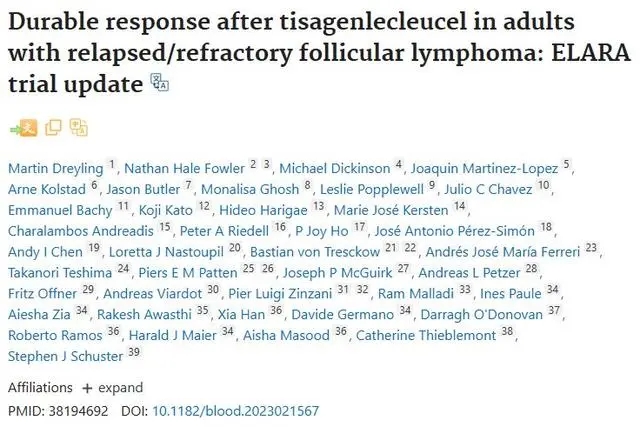Tisagenlecleucel Follicular Lymphoma
Tisagenlecleucel Follicular Lymphoma
Tisagenlecleucel, a groundbreaking CAR-T cell therapy, has shown remarkable potential in the treatment of relapsed or refractory follicular lymphoma (r/r FL). This article aims to provide a comprehensive overview of this innovative therapy, discussing its mechanism of action, clinical trial results, safety profile, and implications for personalized medicine.

1、Understanding Follicular Lymphoma
Follicular lymphoma (FL) is a common subtype of non-Hodgkin’s lymphoma, characterized by a high initial response rate to treatment. However, patients often face a high risk of disease recurrence, with each relapse leading to a diminished response to treatment and a negative impact on both treatment outcomes and quality of life.
2、The Arrival of Tisagenlecleucel
In April 2024, the prestigious journal Blood published an article titled “Durable response after Tisagenlecleucel in adults with relapsed/refractory follicular lymphoma: ELARA trial update.” This study brought new hope to FL patients by introducing Tisagenlecleucel as a novel treatment option.
Study Methodology
The ELARA trial was a multicenter, single-arm, Phase II clinical study designed to evaluate the long-term efficacy and safety of Tisagenlecleucel in adult patients with r/r FL. A total of 97 patients who had received at least two prior lines of treatment or had relapsed after autologous stem cell transplantation were enrolled. Participants received a single dose of Tisagenlecleucel, ranging from 0.6×10^8 to 6×10^8 chimeric antigen receptor (CAR)-positive active T cells. Bridging chemotherapy was allowed, and patients were extensively monitored for clinical and biological markers before and after infusion.
1. Long-Term Efficacy
With a median follow-up of 29 months, the study demonstrated promising results. The median progression-free survival (PFS), duration of response (DoR), and overall survival (OS) had not been reached, indicating that a significant portion of patients remained disease-free or stable after two years. The 24-month PFS rate was 57.4%, DoR rate was 66.4%, and OS rate was 87.7%, showcasing a substantial improvement compared to previous treatments.
2. High Response Rates
Tisagenlecleucel achieved impressive response rates, with a complete response rate (CRR) of 68.1% and an overall response rate (ORR) of 86.2%. Notably, these high response rates were consistent across patients with high-risk disease features, such as POD24 (progression of disease within 24 months after initial immunochemotherapy) and high tumor burden.
3. Safety Profile
The long-term follow-up analysis of Tisagenlecleucel did not reveal any new safety signals or treatment-related mortality. The incidence of infection was 16.5%, with 9.3% of patients experiencing grade 3 or higher severe infections. Most patients (82.0%) resolved any cytopenia within six months, and the resolution rate reached 96.7% at 24 months.
4. Biomarkers: A Key to Personalized Medicine
The study explored various biomarkers, identifying low levels of LAG3+CD3+ exhausted T cells and higher levels of naïve CD8+ T cells as significantly associated with improved outcomes. These findings provide crucial biomarkers for future personalized medicine, helping to identify patients more likely to benefit from Tisagenlecleucel therapy.
5. Efficacy at Lower Doses
Although the study did not establish a clear dose-response relationship, Tisagenlecleucel demonstrated robust efficacy across a wide range of doses. This suggests that even at lower doses, the therapy could offer clinical benefits to patients.
6. Long-Term Cellular Kinetics
Quantitative polymerase chain reaction (qPCR) was used to assess the cellular kinetics of Tisagenlecleucel in patients. The persistence of the CAR transgene was observed for up to 925 days, providing evidence of the durability of CAR-T cell therapies.
7. Outpatient Treatment Feasibility
The study also investigated the feasibility of outpatient Tisagenlecleucel treatment. In some clinical trial centers, patients received the therapy on an outpatient basis, with most not requiring hospitalization post-treatment. This finding indicates that outpatient treatment could be a safe and viable option for eligible patients, potentially reducing their financial and time burdens.
Conclusion
Tisagenlecleucel has emerged as a promising therapy for r/r FL, offering long-term efficacy and a favorable safety profile. The identification of biomarkers associated with response could pave the way for personalized medicine. While the results of the ELARA trial are encouraging, further research is needed to validate these findings and explore the efficacy and safety of Tisagenlecleucel in a broader patient population. The potential for outpatient treatment adds a new dimension to the management of r/r FL, offering a less invasive option for patients. As more long-term follow-up data becomes available, Tisagenlecleucel may well become a new standard of care for patients with follicular lymphoma.
Reference
Dreyling M, Fowler NH, Dickinson M, et al. Durable response after tisagenlecleucel in adults with relapsed/refractory follicular lymphoma: ELARA trial update [J]. Blood. 2024;143(17):1713-1725. doi:10.1182/blood.2023021567IF: 20.3 Q1
